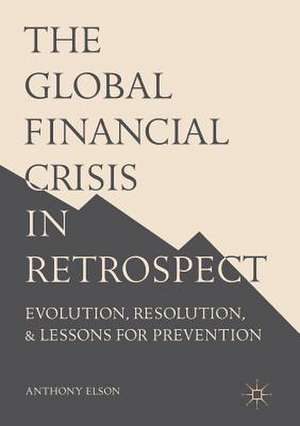The Global Financial Crisis in Retrospect: Evolution, Resolution, and Lessons for Prevention
Autor Anthony Elsonen Limba Engleză Paperback – 10 ian 2019
Comprehensive enough for university students and sufficiently innovative for financial policymakers, this book will appeal to a wide range of readers interested in understanding not just where the crisis has brought us, but what key economists have said about it and how we can strengthen our financial system oversight to deal with the continuing challenges of globalization.
Preț: 196.37 lei
Nou
Puncte Express: 295
Preț estimativ în valută:
37.60€ • 39.15$ • 31.20£
37.60€ • 39.15$ • 31.20£
Carte tipărită la comandă
Livrare economică 14-28 februarie
Preluare comenzi: 021 569.72.76
Specificații
ISBN-13: 9781349937356
ISBN-10: 1349937355
Pagini: 255
Ilustrații: XV, 255 p. 12 illus. in color.
Dimensiuni: 148 x 210 mm
Greutate: 0.33 kg
Ediția:1st ed. 2017
Editura: Palgrave Macmillan US
Colecția Palgrave Macmillan
Locul publicării:New York, United States
ISBN-10: 1349937355
Pagini: 255
Ilustrații: XV, 255 p. 12 illus. in color.
Dimensiuni: 148 x 210 mm
Greutate: 0.33 kg
Ediția:1st ed. 2017
Editura: Palgrave Macmillan US
Colecția Palgrave Macmillan
Locul publicării:New York, United States
Cuprins
1. Introduction
2. The Global Financial Crisis of 2008-2009: Fragile Banking, Economic Bust, and Deflationary Consequences
3. Why Did Economists Get It So Wrong?
4. The Challenge for Macroeconomic Policy in the Wake of the Crisis
5. The Role of the International Financial Architecture Prior to and Since the Crisis
6. The Global Financial Crisis and Inequality
7. The Quest for Financial Stability at the National and Global Levels
8. Towards a Rethinking of Macroeconomics
9. Conclusions and Lessons for the Future
Recenzii
“Elson … offers a study of the aforementioned crisis, which was triggered by the subprime mortgage market. … the book ably reflects a technocrat’s vision of progressively integrated international financial systems and governance. … A thorough, authoritative postmortem, highly recommended for professional economists, scholars, and university students.” (Kirkus Reviews, kirkusreviews.com, March, 2017)
Notă biografică
Anthony Elson is an international economist, writer, and university lecturer in the Washington, DC, area. For a number of years, he was a senior staff member of the International Monetary Fund and consultant with the World Bank. He has also taught at the Duke Center for International Development, the Paul H. Nitze School for Advanced International Studies at Johns Hopkins University, and Yale University.
Textul de pe ultima copertă
This book provides a uniquely comprehensive explanation of the 2008-2009 global financial crisis and resulting scholarly research in the context of building an agenda for reform. With the clarity provided by almost a decade of hindsight and a careful eye toward planning for prevention, Elson guides readers through both historical fact and scholarly interpretation, highlighting areas where careful critique of and changes in the international financial architecture and the mainstream macroeconomic paradigm can promote greater financial stability in the future. Given the great public concern over growing income and wealth inequality, the book examines their links to the increased financialization of the economy, both prior to and since the crisis. Finally, the book identifies a number of lessons that need to be recognized if adequate and effective reforms are to be introduced to avoid a financial crisis of similar magnitude in the future.
Comprehensive enough for university students and sufficiently innovative for financial policymakers, this book will appeal to a wide range of readers interested in understanding not just where the crisis has brought us, but what key economists have said about it and how we can strengthen our financial system oversight to deal with the continuing challenges of globalization.
Comprehensive enough for university students and sufficiently innovative for financial policymakers, this book will appeal to a wide range of readers interested in understanding not just where the crisis has brought us, but what key economists have said about it and how we can strengthen our financial system oversight to deal with the continuing challenges of globalization.
Caracteristici
Examines the financial practices, economic policies, and regulatory frameworks that supported the buildup and transition to the crisis
Analyzes the key challenges for macroeconomic policy and regulatory practice in the wake of the crisis
Identifies specific lessons to guide effective reforms that will minimize the risk of similar crises in the future
Analyzes the key challenges for macroeconomic policy and regulatory practice in the wake of the crisis
Identifies specific lessons to guide effective reforms that will minimize the risk of similar crises in the future
